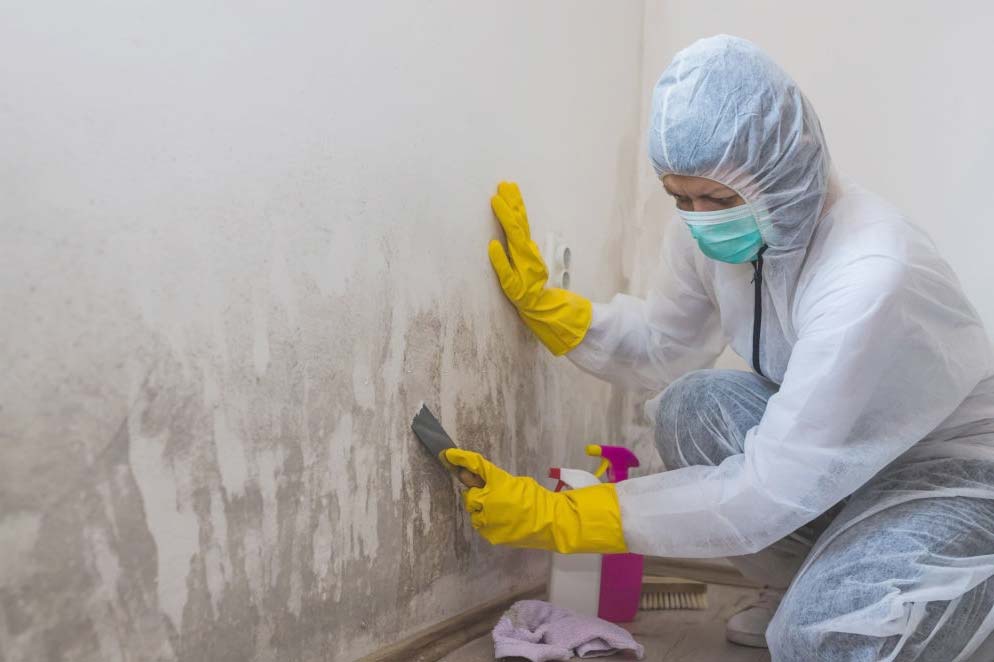Mold poses a threat to human health and the environment in North Carolina. It’s important for landlords and tenants alike to efficiently address mold-related problems.
North Carolina does not have a law that requires landlords to remediate mold. However, landlords must fix excessive stagnant water, sewage, flooding waters, plumbing leaks, and inadequate drainage, which can cause mold growth.
Therefore, tenants should notify their landlords anytime their home is at risk of mold growth. The landlord will then contact a professional to fix the mold problem.

What we cover
ToggleLandlord rights and responsibilities in North Carolina
- Keep the tenant’s home safe, clean, and habitable. It includes paying for the remediation of mold and fixing any leaks and other causes of mold growth.
- Ensure that electrical and other fixtures are properly installed, maintained, and repaired where necessary.
- Provide privacy and quiet enjoyment to their tenants. Landlords must give prior notice to their tenants whenever they need to access their property.
Resource: See other state mold laws
Tenant rights and responsibilities in North Carolina
- Pay rent as agreed.
- Comply with all building and housing codes.
- Keep the unit clean and habitable at all times.
- Pay for or perform minor repairs and maintenance.
- Proper waste disposal.
- Proper use of all facilities.
- Ensure quiet enjoyment for neighbors and other tenants.
- Not to deliberately or negligently destroy any part of the unit.
How long does a landlord have to repair mold in North Carolina?
Landlords in North Carolina have a duty to provide a habitable living space for their tenants. One way of doing it is by making repairs requested within a reasonable time.
For emergency repairs or damage that may make the unit uninhabitable, the landlord has 24 to 48 hours.
For other repairs, landlords in New Mexico have up to 14 days.
If the landlord does not fix the damage after a reasonable time, tenants can withhold rent or break their lease without penalty.
Mold disclosure law in North Carolina
North Carolina does not have any laws that require landlords to disclose the presence of mold in their units to new tenants.
A federal law that requires them to disclose the presence of lead paint for homes built before 1978.
Here are some of the other disclosures that landlords should make:
- Details about the security deposit.
- Any additional fees over the rent.
- A move-in checklist indicates any material damage to the unit.
- Local rent control rules.
- Information on the use of shared utilities.
- Safety gadgets installation and maintenance.
- The identity and location of the landlord and agent.
- Recent flooding in the unit and how it was repaired.
- Results from mold tests.
- Building code violations on the property.
Can you break rental lease in North Carolina due to mold?
Tenants in North Carolina can break their rental lease without penalty under the following conditions.
- To start active military duty.
- Early termination clause invoked by either the tenant or landlord.
- The property is uninhabitable. High levels of mold are a health hazard. If the landlord does not remediate in good time, the tenant can move out.
- Landlord harassment.
- If you are a victim of domestic violence, sexual assault, or stalking.
In addition, the law in North Carolina requires the landlord to re-rent the unit as soon as it is empty. It allows you to break your lease without having to pay for the remaining months.
You can also get a replacement tenant to take up the unit.
Can a North Carolina tenant withhold rent?
A North Carolina tenant can withhold rent to compel the landlord to fix some damage in the unit.
Before tenants decide to withhold rent, they should:
- Be up to date with rent payments.
- Not have caused the damage they are asking the landlord to fix.
- Inform the landlord of the problem before it causes the unit to be uninhabitable.
- Offer sufficient time to the landlord to fix the problem.
- Be willing to get evicted.
You can also opt to pay for the repair and deduct the amount from the rent. The cost of repair must be less than the rent.
Can a North Carolina tenant seek justice in court?
Yes. There are situations where a tenant in New Mexico can seek justice in court.
- Recover damages from the landlord when they believe they have been injured by the presence of mold in their homes.
- You can sue your landlord if their negligence was the cause of the mold.
- Tenants can sue their landlord in small claims court to return their deposit.
- Interferes with your right to quiet enjoyment. Once you sign the rental lease, the landlord should allow you the freedom to enjoy the property in peace. They should always give notice if they want to access the property
- Wrongful eviction.
- When you get injured at the property.
- When your home is uninhabitable. If the home is unsafe and unlivable from mold or another problem and your landlord has refused to fix it, you can sue them.
- Discrimination.












